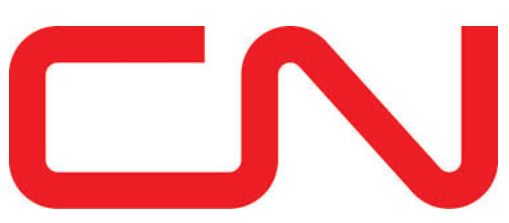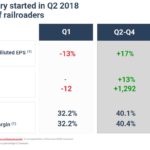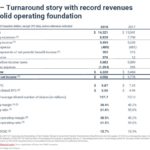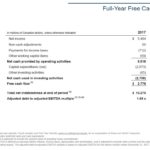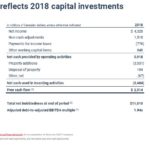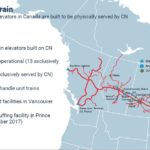Summary
- CNR has just released its Q4 and FY2018 results which reflect remarkable turnaround from early 2018.
- A ~18% increase in CNR’s quarterly dividend has just been announced together with details of a new normal course issuer bid.
- While CNR is already one of my largest holdings I am open to acquiring additional shares in this well run company.
- I view shares as being fairly valued but am of the opinion another broad market pullback similar to that in December 2018 is not out of the realm of possibility. I will patiently bide my time for an even more favorable valuation.
NOTE: All figures are expressed in Canadian dollars.
Introduction
What a difference from a year ago! On January 29, 2018 I wrote that Canadian National Railway Company (TSX: CNR), a core holding within the FFJ Portfolio, was attractively valued. At the time of that article CNR’s stock price had retraced from a high of ~$106 set early January 2018 and it had just announced a 10% increase to its quarterly dividend; the new quarterly dividend had just been increased to $0.455 from $0.4125.
When I wrote that article CNR’s relationship with certain segments of its customer base had taken a severe hit in late 2017 and early 2018 which ultimately led to the ousting of CNR’s CEO.
Heeding Warren Buffett’s advice that
“The best thing that happens to us is when a great company gets into temporary trouble…We want to buy them when they’re on the operating table.”
I informed subscribers in my January 29, 2018 article that I would be adding to my CNR holdings; I acquired another 400 shares at $98.20. While CNR was out of favor with the investment community I was of the opinion that its challenges were temporary.
By the time I wrote my follow-up July 25, 2018 article, CNR had taken significant steps to repair these relationships; this included the hiring of engineers and significant investments in infrastructure. These changes were well received by the investment community and CNR’s share price had risen to $116.80.
I concluded that article with:
‘Now, while I like the direction CNR is headed, I think the current stock price is just a tad rich. It is not excessively expensive but the shares are no longer ‘on sale’ as they were when I added to my position in late January.
CNR is certainly a great long-term investment so if you are inclined to take a position in the company, I would ease in and periodically acquire additional shares on pullbacks.’
I then wrote a follow up article on October 24, 2018 in which I concluded with:
‘CNR’s shares have since pulled back ~$10 from early October when they were trading at ~$117 – ~$118 and are now valued just a shade above their 5 year average.
I currently have a full position and do not intend to acquire additional shares other than through the automatic reinvestment of dividends.’
CNR’s shares were ultimately caught up in the broad market pullback in December and its share price plunged to the mid $90s…just in time for the end of December dividends to be automatically reinvested at an attractive level.
In just over a month, however, CNR’s share price has bounced back to ~$109.70.
The company has just announced its FY2019 Outlook and has increased its quarterly dividend by ~18.1% to $0.5375 from $0.455 payable on March 29, 2019 to shareholders of record at the close of business on March 8, 2019.
Now that CNR has released FY2019 guidance I am taking this opportunity to revisit CNR to determine whether the current price presents investors with an attractive buying opportunity based on guidance or whether a wait and see approach is preferable.
Q4 and FY2018 Financial Results
CNR’s Q4 and FY2018 results released January 29, 2019 can be found here and its non-GAAP Measures commentary can be accessed here.
As evidenced from the following results we see the extent to which CNR has turned around its performance within 2018. While I was of the opinion that CNR’s problems were temporary and could be fixed if the proper measures were taken I certainly did not expect results to improve to this extent and so quickly.
Source: CNR Q4 and FY2018 Earnings Presentation – January 29, 2019
While diluted EPS of $5.87 decreased 19% from the $7.24 reported in FY2017, included in the 2017 diluted EPS was a deferred income tax recovery of $2.33 per diluted share.
On an adjusted basis, CNR reported a 10% increase in adjusted diluted EPS ($5.50 increased from $4.99) which was the result from the enactment of a lower U.S. federal corporate income tax rate.
In FY2017, CNR’s Free Cash Flow (FCF) was as follows.
Source: CNR Q4 and FY2017 Earnings Presentation – January 23, 2018
In FY2018, CNR’s FCF was as follows.
Source: CNR Q4 and FY2018 Earnings Presentation – January 29, 2019
While FCF dropped $0.264B, the importance of reinvesting in the business has been clearly demonstrated by the improvement in CNR’s results. I am not, therefore, concerned about the YoY drop in FCF.
FY2019 Outlook
CNR continues to focus on operational productivity and services that resonate with its customers. To this end, it has targeted a $3.9B capital program in which the focus will be on investing in the renewal of a more efficient and reliable locomotive fleet, adding network capacity to accommodate growth in diverse markets, and bringing technology to its Precision Scheduled Railroading.
With CN-specific growth opportunities, combined with a broadly positive economic backdrop, CNR expect high single-digit volume growth in 2019 in terms of revenue ton miles (RTMs). CNR also expects to deliver EPS growth in the low double-digit range compared to adjusted diluted EPS of $5.50 in 2018.
Source: CNR Q4 and FY2018 Earnings Presentation – January 29, 2019
I find it to be of particular interest that despite the strained relationship between Western Canada’s grain producers and CNR in late FY2017 and early FY2018, the vast majority of new grain elevators in Canada are being built/have been built to be physically serviced exclusively by CNR.
Source: CNR Q4 and FY2018 Earnings Presentation – January 29, 2019
Credit Ratings
Moody’s continues to rate CNR’s senior unsecured long-term debt A2 which is the middle tier of the ‘upper medium grade’ rating.
S&P Global rates CNR’s senior unsecured long-term debt A which is the middle tier of the ‘upper medium grade’ rating.
The A2 and A ratings are equivalent.
Neither agency has CNR’s credit ratings under review.
These attractive credit ratings confirm neither agency is of the opinion CNR will have any difficulty in servicing its obligations.
Valuation
In my January 29, 2018 article I noted that management had disclosed an adjusted diluted EPS target range of $5.25 – $5.40 (versus $4.99 in 2017). Using the January 25, 2018 $97.02 closing stock price, I arrived at a forward adjusted diluted EPS ratio range of ~18 – ~18.5.
At the time of my July 25th article, CNR’s stock price was trading at ~$116.80. Using the revised adjusted diluted EPS range of $5.30 – $5.45 I arrived at a forward adjusted diluted EPS ratio range of ~21.4 – ~22.
When I wrote my October 24th article, management had just indicated on the Q3 conference call that it was still aiming to deliver adjusted diluted EPS in the range of $5.30 – $5.45. With CNR trading at ~$107.80 that gave us a forward adjusted diluted EPS ratio range of ~19.78 – ~20.34.
On a GAAP basis, CNR generated FY2017 diluted EPS of $7.24 thus giving us a diluted PE of ~13.4 on the basis of the January 25, 2018 $97.02 closing stock price. As noted earlier, however, the $7.24 was impacted by a deferred income tax recovery of $2.33 per diluted share. If we back out this one-time item then 2017 diluted EPS was closer to $4.91. Using the $97.02 stock price this gave us a ~19.76 diluted PE.
We now know that CNR generated FY2018 diluted EPS of $5.87 and adjusted diluted EPS of $5.50. Using the current ~$109.70 share price we see that CNR’s diluted PE is ~18.69 and adjusted diluted PE is ~19.95.
CNR is now targeting EPS growth in the low double-digit range compared to adjusted diluted EPS of $5.50 in 2018. If we use a 10% – 12% growth rate then FY2019 EPS would be in the range of $6.05 – $6.16.
Once again, using the current ~$109.70 share price we get a forward diluted PE in the range of ~17.81 – ~18.13.
Dividend, Dividend Yield, Dividend Payout Ratio, and Share Repurchases
CNR’s dividend history can be found here.
Details of CNR’s recently announced dividend increase and the new normal course issuer bid that were both approved by CNR’s Board of Directors can be found here. In a nutshell, CNR’s Board of Directors approved a new normal course issuer bid that permits CNR to purchase, for cancellation, over a 12-month period up to 22 million common shares, starting on Feb. 1, 2019, and ending no later than Jan. 31, 2020.
The new $0.5375 quarterly dividend ($2.15 annually) provides investors with a ~1.96% yield based on the current ~$109.70 share price. At the time of my October 24th article, CNR was trading at ~$107.70 and its quarterly $0.455 dividend ($1.82 annually) provided investors with a dividend yield of ~1.69%.
CNR continues to target a 35% adjusted dividend payout ratio and surplus cash will continue to be deployed toward share repurchases.
As at the end of FY2011 the weighted-average number of diluted shares outstanding amounted to 908.9 million. As at the end of FY2018, share count had been reduced to 737.7 million.
Final Thoughts
While I consider my current CNR position to be a full position I am always open to acquiring shares in great companies if shares are attractively valued and other investment opportunities are not as attractive.
Based on management’s guidance for FY2019 CNR appears to be fairly valued at the ~$109.70 level. I do not, therefore, intend to acquire additional shares at the current level.
Were we to experience another pullback similar to that experienced in December I would very seriously consider acquiring additional CNR shares. Until such time as this does happen I will just patiently wait on the sidelines.
I wish you much success on your journey to financial freedom.
Thanks for reading!
Note: I sincerely appreciate the time you took to read this article. Please send any feedback, corrections, or questions to charles@financialfreedomisajourney.com.
Disclaimer: I have no knowledge of your individual circumstances and am not providing individualized advice or recommendations. I encourage you not to make any investment decision without conducting your own research and due diligence. You should also consult your financial advisor about your specific situation.
Disclosure: I am long CNR.
I wrote this article myself and it expresses my own opinions. I am not receiving compensation for it and have no business relationship with any company whose stock is mentioned in this article.


